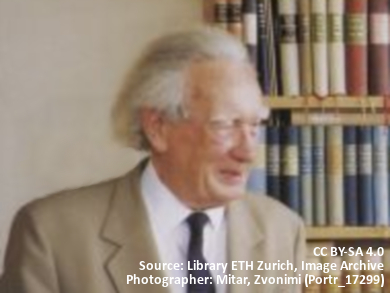Derek Harold Richard Barton was born on September 8, 1918, in Gravesend, UK. He studied chemistry at the Imperial College of the University of London, UK, where he received his Ph.D. in organic chemistry in 1942. During World War II, he worked as a research chemist for the government. After the war and a short time as a research chemist for Albright and Wilson in Birmingham, UK, Barton returned to Imperial College as Assistant Lecturer.
In 1948, R. B. Woodward gave a guest lecture at Imperial College, which made quite an impression on Barton. In 1949 and 1950, Barton served as Guest Lecturer at Harvard University, Cambridge, MA, USA—substituting for Woodward, who had taken a sabbatical. It was at Harvard where Barton performed his pioneering work on conformational analysis.
Conformational analysis can be used to predict and explain selectivity and mechanisms in organic chemistry. Since this was before the rise of computers in science, Barton actually used a slide rule to perform the first force-field calculations on the chair and boat conformations of cyclohexane rings. His results were in agreement with the work of the Norwegian chemist Odd Hassel, who had worked on the preferred conformation of molecules such as cyclohexane and decalin, which is composed of two fused cyclohexane rings [1]. Barton submitted his seminal paper on the conformation of steroids [2] in 1950, which would later lead to his winning the Nobel Prize.
Barton returned to the UK later in 1950 and became Reader in Organic Chemistry at Birkbeck College, University of London. He was promoted to Full Professor there in 1953. In 1955, he was appointed Regius Professor for Chemistry at the University of Glasgow, UK. In 1957, he returned yet again to Imperial College, this time as Professor. In 1978, Barton became Director at the Institut de Chimie des Substances Naturelles (ICSN) in Gif Sur-Yvette, France. In 1986, he was named Distinguished Professor at Texas A&M University, College Station, USA, where he remained for the rest of his career. Sir Derek Barton died on March 16, 1998, in College Station.
Among many other honors, Barton received the Nobel Prize in Chemistry in 1969 together with Odd Hassel “for their contributions to the development of the concept of conformation and its application in chemistry”. Barton was knighted by Queen Elizabeth II in 1972. Several reactions in organic chemistry carry his name, such as the Barton reaction [3], the Barton decarboxylation [4], and the Barton-McCombie deoxygenation [5].
Sir Derek Barton is the answer to Guess the Chemist (81).
References
- [1] Structure of the so-called cis-decalin,
O. Bastiansen, O. Hassel,
Nature 1946, 157, 765–765.
https://doi.org/10.1038/157765a0 - [2] The conformation of the steroid nucleus,
D. H. R. Barton,
Experientia 1950, 6, 316–320.
https://doi.org/10.1007/bf02170915 - [3] A New Photochemical Reaction,
D. H. R. Barton, J. M. Beaton, L. E. Geller, M. M. Pechet,
J. Am. Chem. Soc. 1961, 83, 4076–4083.
https://doi.org/10.1021/ja01480a030 - [4] New and improved methods for the radical decarboxylation of acids,
D. H. R. Barton, D. Crich, W. B. Motherwell,
J. Chem. Soc. Chem. Commun. 1983.
https://doi.org/10.1039/C39830000939 - [5] A new method for the deoxygenation of secondary alcohols,
D. H. R. Barton, S. W. McCombie,
J. Chem. Soc. Perkin Trans. 1 1975.
https://doi.org/10.1039/p19750001574
Sources
- Derek H. R. Barton: Biographical,
Nobel Lectures, Chemistry 1963-1970,
Elsevier Publishing Company, Amsterdam, 1972. - Sir Derek Harold Richard Barton. 8 September 1918 – 16 March 1998,
S. V. Ley, R. M. Myers,
Biogr. Mem. Fellows Royal Soc. 2002, 48, 1–23.
https://doi.org/10.1098/rsbm.2002.0001
Selected Publications
- The stereochemistry of cyclohexane derivatives,
D. H. R. Barton,
J. Chem.Soc. 1953.
https://doi.org/10.1039/jr9530001027 - The principles of conformational analysis,
D. H. R. Barton, R. C. Cookson,
Q. Rev. Chem. Soc. 1956, 10, 44.
https://doi.org/10.1039/qr9561000044 - Reason and Imagination: Reflections on Research in Organic Chemistry,
D. H. R. Barton,
World Scientific Pub Co. Inc., 1996.
ISBN: 978-9810213619 - The selective functionalization of saturated hydrocarbons: Gif chemistry,
D. H. R. Barton, D. Doller,
Acc. Chem. Res. 2002, 25, 504–512.
https://doi.org/10.1021/ar00023a004



